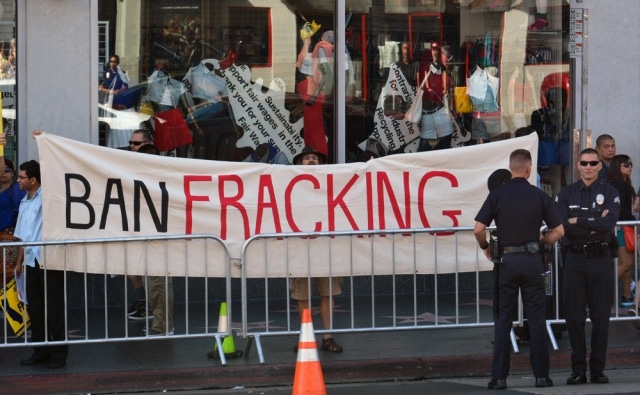The only lawsuit seeking to overturn any of the local fracking bans in the state of California has been dropped.
Southern California-based Citadel Exploration filed a suit on February 27 against San Benito County’s Measure J, which voters approved by a wide margin last November despite the oil and gas industry outspending its opponents 13-to-1 in an attempt to defeat the measure.
Citadel had called Measure J an “illegal local statutory scheme” and argued that only the state has the right to regulate oil and gas development, according to the San Jose Mercury News. The company has not released any further statements or responded to requests for comment on why it chose to drop the suit.
But anti-fracking activists and others who have worked on the fracking bans have their own theories.
“It’s pretty clear to me now that the oil industry was bluffing,” Andy Hsia-Coron, a retired schoolteacher who helped run the Measure J campaign, told the San Jose Mercury News. “As they examined their hand, they realized it was pretty weak.”
“Local governments can prohibit high-intensity oil and gas operations under their fundamental land use authority,” Heather Minner, an attorney with the firm Shute, Mihaly & Weinberger, which drafted Measure J, said in a statement. “Measure J sailed onto the ballot without any pre-election challenges and it’s not surprising that Citadel dropped its post-election suit like a hot potato.”
“This is a great victory for our community,” Mary Hsia-Coron, another leader in the Measure J campaign, said in the same statement. “Our volunteers worked hard to educate voters about how fracking, cyclic steam and acidizing threaten our water, our health and our economic future. Other communities should take heart that they have the power to protect what they love. They can stand up to the oil industry and say ‘no’ to these dangerous practices.”
That, of course, is exactly what oil and gas companies fear the most – a domino effect, whereby one community banning fracking emboldens others. Residents of Mendocino County, California, also voted to ban fracking in last November’s elections, while the board of supervisors for Santa Cruz County adopted a ban last year. Santa Clara, Monterey and Butte Counties are all expected to place a fracking ban on the ballot next year.
Perhaps the most visible fracking ban to date is in New York. Governor Andrew Cuomo announced last December that he was making the state’s moratorium an indefinite ban, writing on Twitter, “The potential impacts of fracking on water, air, land resources, community and local services are significant.”
Another high-profile ban, also approved by an overwhelming number of voters at the ballot box last November, was in Denton, TX. Pushback from industry was swift after passage of the ban and remains fierce today, in stark contrast to the situation in California.
The election hadn’t been over for 24 hours before the oil and gas industry went on the attack against Denton’s fracking ban, and they’re still at it. And earlier this week, DeSmogBlog reported that, at a March 24 hearing that took place just before passage of a bill that preempts Texas cities’ ability to regulate fracking, numerous witnesses testifying against the ban failed to disclose their ties to the oil and gas industry, including some ties to the Koch Brothers.
But perhaps that’s to be expected given that Denton is commonly considered the birthplace of fracking and, as Earthworks energy program director Bruce Baizel said in the aftermath of the election: “If this place in the heart of the oil and gas industry can’t live with fracking, then who can?”
Hollin Kretzmann, an attorney for the Center for Biological Diversity, said in a press release that the fact that no legal challenges have been successfully mounted against California’s fracking bans will surely lead to more efforts to curtail the controversial well stimulation technique. “So much for the oil industry’s empty threats against communities that fight fracking pollution.”
Image Credit: Dan Holm / Shutterstock.com
Subscribe to our newsletter
Stay up to date with DeSmog news and alerts







